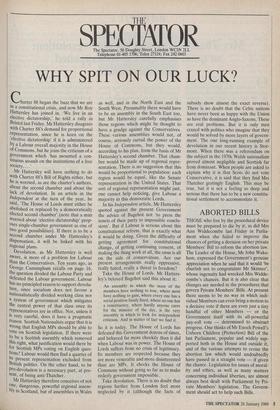The Spectator, 56 Doughty Street, London . WC1N 2LL Telephone 01-405
1706; Telex 27124; Fax 242 0603
WHY SPIT ON OUR LUCK?
Charter 88 began the buzz that we are in a constitutional crisis, and now Mr Roy Hattersley has joined in. 'We live in an elective dictatorship,' he told a rally in Bristol last Friday. Mr Hattersley disagrees with Charter 88's demand for proportional representation, since he is keen on the `elective dictatorship' if it is administered by a Labour overall majority in the House of Commons, but he joins the criticism of a government which 'has mounted a con- tinuous assault on the institutions of a free society....
Mr Hattersley will have nothing to do with Charter 88's Bill of Rights either, but he is worried, as are the charter's authors, about the second chamber and about the lack of devolution. In an article in the Independent at the turn of the year, he • said, The Hquse of Lords must either be abolished or replaced by a democratically elected second chamber' (note that a man worried about 'elective dictatorship' prop- oses single-chamber government as one of two good possibilities). If there is to be a second chamber under Mr Hattersley's dispensation, it will be linked with his regional plans. Devolution, as Mr Hattersley is well aware, is more of a problem for Labour than the Conservatives. Ten years ago, as George Cunningham recalls on page 16, the question divided the Labour Party and defeated the Labour government. Labour has no principled reason to support devolu- tion, since socialism does not favour a nationalistically divided working class nor a system of government which mitigates the central power of that class once its representatives are in office. Nor, unless it is very careful, does it have a pragmatic reason. Scottish Nationalists argue that it is wrong that English MPs should be able to vote on Scottish legislation. If there were to be a Scottish assembly which removed this right, what justification would there be for Scottish MPs voting on English ques- tions? Labour would then find a quarter of its present representation excluded from British politics. On the other hand, to be pro-devolution is a necessary part, at pre- sent, of being anti-Thatcher. Mr Hattersley therefore conceives of not one, dangerous, powerful regional assem- bly in Scotland, but of assemblies in Wales as well, and in the North East and the South West. Presumably there would have to be an assembly in the South East too, but Mr Hattersley carefully emphasises those regions which might be thought to have a grudge against the Conservatives. These various assemblies would, not, of course, seriously curtail the power of the House of Commons, but they would, according to his plan, form the basis of. Mr Hattersley's second chamber. That cham- ber would be made up of regional repre- sentation. There is no suggestion that this would be proportional to population: each Legion would be equal, like the Senate representation in the United States. That sort of regional representation might just, one cannot help noticing, give Labour a majority in this democratic Lords. In his Independent article, Mr Hattersley quoted against the present Government the advice of Bagehot not 'to press the tenets of their party to impossible conclu- sions'. But if Labour is serious about this constitutional reform, that is exactly what it would be doing. Given the difficulty of getting agreement for constitutional change, of getting continuing consent, of making the thing work at all, the onus is all on the side of conservatism. Are our present arrangements really oppressive, really hated, really a threat to freedom? Take the House of Lords. Mr Hatters- ley's beloved Bagehot said this about it: An assembly in which the mass of the members have nothing to lose, where most have nothing to gain, where every one has a social position firmly fixed, where no one has a constituency, where hardly anyone cares for the minister of the day, is the very assembly in which to look for independent criticism. And in matter of fact we find it.
So it is today. The House of Lords has defeated this Government dozens of times, and behaved far more cheekily than it did when Labour was in power. The House of Lords suffers from no crisis of legitimacy. Its members are respected because they are more venerable and more disinterested than are MPs. It checks the House of Commons without going so far as to make orderly government impossible.
Take devolution. There is no doubt that regions further from London feel more neglected by it (although the facts of subsidy show almost the exact reverse). There is no doubt that the Celtic nations have never been as happy with the Union as have the dominant Anglo-Saxons. These are real problems. But it is only men crazed with politics who imagine that they would be solved by more layers of govern- ment. The one long-running example of devolution in our recent history is Stor- mont. When there was a referendum on the subject in the 1970s Welsh nationalism proved almost negligible and Scottish far from dominant. When people are asked to explain why it is that Scots do not vote Conservative, it is said that they find Mrs Thatcher gratingly English. This may be true, but it is not a feeling so deep and serious that there has to be a new constitu- tional settlement to accommodate it.

















































 Previous page
Previous page